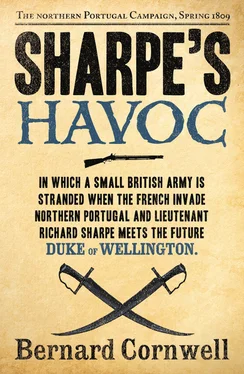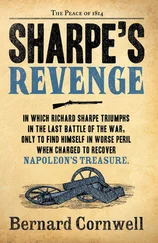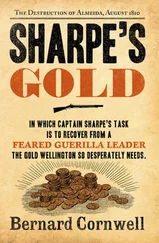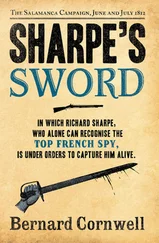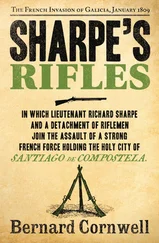The French had come back.
Colonel James Christopher liked wearing the hussar uniform. He decided it suited him and he spent a long time admiring himself in the pier glass in the farmhouse’s largest bedroom, turning left and right, and marvelling at the feeling of power conveyed by the uniform. He deduced it came from the long tasselled boots and from the jacket’s high stiff collar that forced a man to stand upright with his head back, and from the fit of the jacket that was so tight that Christopher, who was lean and fit, still had to suck in his belly to fasten the hooks and eyes down its silver-laced front. The uniform made him feel encased in authority, and the elegance of the outfit was enhanced by the fur-edged pelisse that was draped from his left shoulder and by the silver-chained sabre scabbard that chinked as he went downstairs and as he paced up and down the terrace where he waited for his guest. He put a sliver of wood into his mouth, obsessively working it between his teeth as he gazed at the distant smear of smoke which showed where buildings burned in the captured city. A handful of fugitives had stopped at the farm to beg for food and Luis had talked with them and then told Christopher that hundreds if not thousands of people had drowned when the pontoon bridge broke. The refugees claimed that the French had wrecked the bridge with cannon fire and Luis, his hatred of the enemy fuelled by the false rumour, eyed his master with a surly expression until Christopher had finally lost his patience. ‘It is only a uniform, Luis! It is not a sign of a changed allegiance!’
‘A French uniform,’ Luis had complained.
‘You wish Portugal to be free of the French?’ Christopher snapped. ‘Then behave respectfully and forget this uniform.’
Now Christopher paced the terrace, picking at his teeth and constantly watching the road that led across the hill. The clock in the farm’s elegant parlour struck three and no sooner had the last chime faded than a large column of cavalry appeared across the far crest. They were dragoons and they came in force to make sure that no partisans or fugitive Portuguese troops gave trouble to the officer who rode to meet Christopher.
The dragoons, all from the 18th regiment, wheeled away into the fields beneath the farmhouse where a stream offered water for their horses. The cavalrymen’s rose-fronted green coats were white with dust. Some, seeing Christopher in his French hussar’s uniform, offered a hasty salute, but most ignored him and just led their horses towards the stream as the Englishman turned to greet his visitor.
His name was Argenton and he was a captain and the Adjutant of the 18th Dragoons and it was plain from his smile that he knew and liked Colonel Christopher. ‘The uniform becomes you,’ Argenton said.
‘I found it in Oporto,’ Christopher said. ‘It belonged to a poor fellow who was a prisoner and died of the fever and a tailor trimmed it to size for me.’
‘He did well,’ Argenton said admiringly. ‘Now all you need are the cadenettes .’
‘The cadenettes ?’
‘The pigtails,’ Argenton explained, touching his temples where the French hussars grew their hair long to mark themselves as elite cavalrymen. ‘Some men go bald and have wigmakers attach false cadenettes to their shakoes or colbacks.’
‘I’m not sure I want to grow pigtails,’ Christopher said, amused, ‘but perhaps I can find some girl with black hair and cut off a pair of tails, eh?’
‘A good idea,’ Argenton said. He watched approvingly as his escort set picquets, then smiled his thanks as a very sullen-looking Luis brought him and Christopher glasses of vinho verde , the golden white wine of the Douro valley. Argenton sipped the wine cautiously and was surprised that it was so good. He was a slight man with a frank, open face and red hair that was damp with sweat and marked where his helmet had been. He smiled easily, a reflection of his trusting nature. Christopher rather despised the Frenchman, but knew he would be useful.
Argenton drained the wine. ‘Did you hear about the drownings in Oporto?’ he asked.
‘My servant says you broke the bridge.’
‘They would say that,’ Argenton said regretfully. ‘The bridge collapsed under the weight of the refugees. It was an accident. A sad accident, but if the people had stayed in their homes and given our men a decent welcome then there wouldn’t have been any panic at the bridge. They’d all be alive now. As it is, we’re being blamed, but it had nothing to do with us. The bridge wasn’t strong enough and who built the bridge? The Portuguese.’
‘A sad accident, as you say,’ Christopher said, ‘but all the same I must congratulate you on your swift capture of Oporto. It was a notable feat of arms.’
‘It would have been still more notable,’ Argenton observed, ‘if the opposition had been better soldiers.’
‘I trust your losses were not extravagant?’
‘A handful,’ Argenton said dismissively, ‘but half of our regiment was sent eastwards and they lost a good few men in an ambush by the river. An ambush’ – he looked accusingly at Christopher – ‘in which some British riflemen took part. I didn’t think there were any British troops in Oporto?’
‘There shouldn’t have been,’ Christopher said, ‘I ordered them south of the river.’
‘Then they disobeyed you,’ Argenton said.
‘Did any of the riflemen die?’ Christopher asked, mildly hoping that Argenton would have news of Sharpe’s death.
‘I wasn’t there. I’m posted to Oporto where I find billets, look for rations and do the errands of war.’
‘Which I am sure you discharge admirably,’ Christopher said smoothly, then led his guest into the farmhouse where Argenton admired the tiles about the dining-room hearth and the simple iron chandelier that hung above the table. The meal itself was commonplace enough: chicken, beans, bread, cheese and a good country red wine, but Captain Argenton was complimentary. ‘We’ve been on short rations,’ he explained, ‘but that should change now. We’ve found plenty of food in Oporto and a warehouse stuffed to the rafters with good British powder and shot.’
‘You were short of those too?’ Christopher asked.
‘We have plenty,’ Argenton said, ‘but the British powder is better than our own. We have no source of saltpetre except what we scrape from cesspit walls.’
Christopher grimaced at the thought. The best saltpetre, an essential element of gunpowder, came from India and he had never considered that there might be a shortage in France. ‘I assume,’ he said, ‘that the powder was a British gift to the Portuguese.’
‘Who have now given it to us,’ Argenton said, ‘much to Marshal Soult’s delight.’
‘Then it is time, perhaps,’ Christopher suggested, ‘that we made the Marshal unhappy.’
‘Indeed,’ Argenton said, ‘indeed,’ and then fell silent because they had reached the purpose of their meeting.
It was a strange purpose, but an exciting one. The two men were plotting mutiny. Or rebellion. Or a coup against Marshal Soult’s army. But however it was described it was a ploy that might end the war.
There was, Argenton now explained, a great deal of dissatisfaction in Marshal Soult’s army. Christopher had heard all this before from his guest, but he did not interrupt as Argenton rehearsed the arguments that would justify his disloyalty. He described how some officers, all devout Catholics, were mortally offended by their army’s behaviour in Spain and Portugal. Churches had been desecrated, nuns raped. ‘Even the holy sacraments have been defiled,’ Argenton said in a horrified tone.
‘I can hardly believe it,’ Christopher said.
Other officers, a few, were simply opposed to Bonaparte. Argenton was a Catholic monarchist, but he was willing to make common cause with those men who still held Jacobin sympathies and believed that Bonaparte had betrayed the revolution. ‘They cannot be trusted, of course,’ Argenton said, ‘not in the long run, but they will join us in resisting Bonaparte’s tyranny.’
Читать дальше
